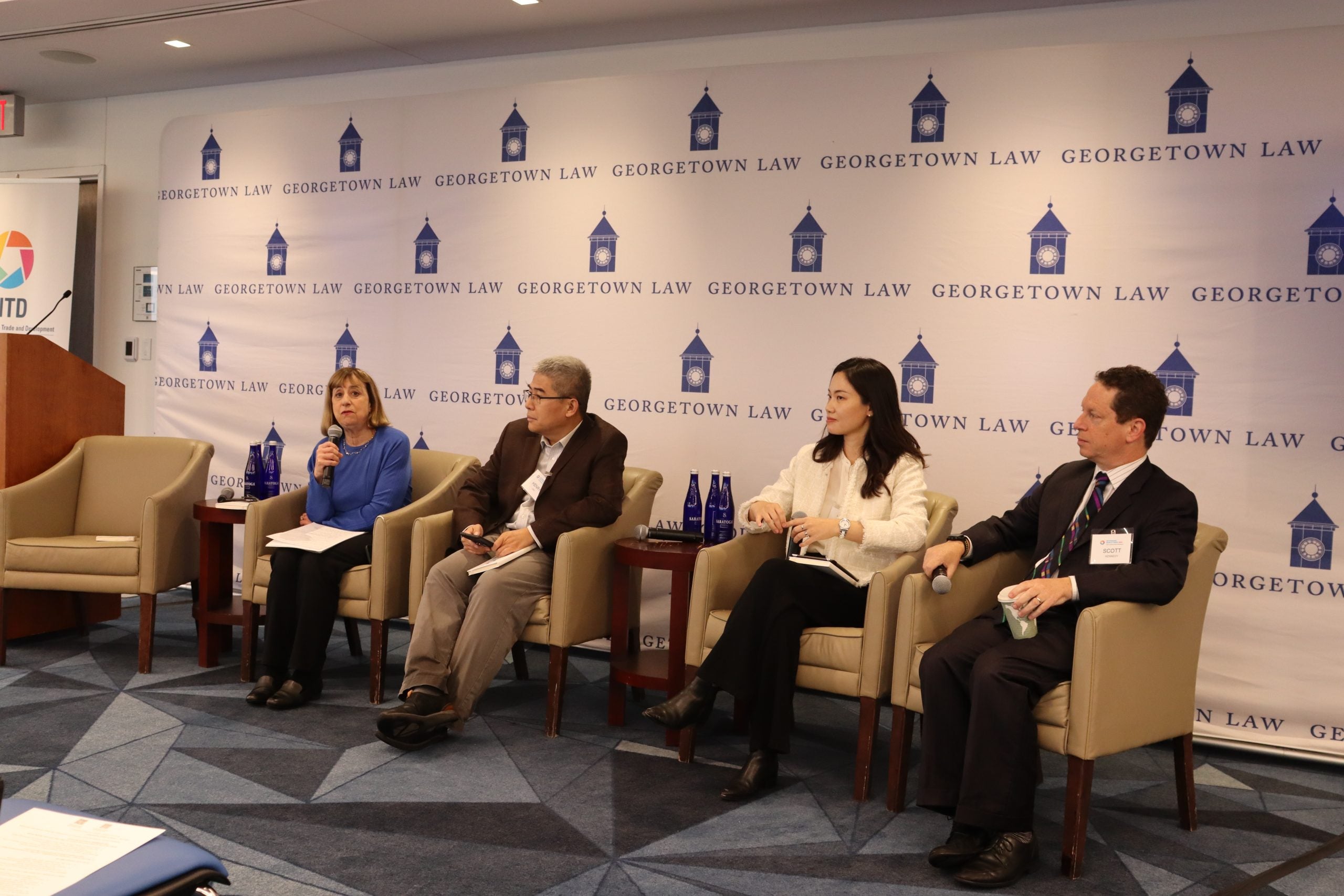U.S.-China Relations in a Post-"China Shock" Era

From left to right: Wendy Cutler, Henry Gao, Huan Zhu, and Scott Kennedy
Published May 9, 2024 by Elizabeth Butscher
The Center on Inclusive Trade and Development (CITD) held its second annual Rethinking World Trade conference on Wednesday, April 3rd, 2024. Our first panel, which followed the launch of “Sustainability in International Trade Agreements,” a book co-edited by Georgetown Law Professor Kathleen Claussen, focused on U.S.-China relations in the aftermath of the so-called “China Shock.” This term refers to the roughly 2 million jobs, particularly in manufacturing, lost in the U.S. to trade with China between 1997 and 2011 due (at least in part) to an influx of Chinese imports. Although these figures have been considerably debated, it is undeniable that the U.S.-China trading relationship has had a significant impact on global trade. Our panelists included Professor Henry Gao of Singapore Management University; Huan Zhu, the Vice-President of the China Trade Monitor; Scott Kennedy, Senior Adviser and Trustee Chair in Chinese Business and Economics at the Center for Strategic and International Studies; and was moderated by Wendy Cutler of the Asia Society Policy Institute.
Topics discussed included China’s accession to the World Trade Organization (WTO) and its role within the WTO, as well as the ability of the trade community as a whole to address the challenges posed by China’s economic ascension. According to Scott Kennedy, China’s entry into the WTO was beneficial for both the U.S. and the world. It expanded the global economy and supported U.S. national security. Kennedy argued that integrating a growing China into the global market was necessary. Further, he contended that any “shock” ended in 2010 and that job losses since then have not been primarily related to Chinese imports. Kennedy also went on to argue that most U.S. job losses were attributable to automation rather than Chinese imports. While China did engage in practices that were unfair, the U.S. also did not do enough to protect its own workers.
China’s role in the WTO sparked considerable conversation, particularly from Henry Gao—a supporter of the WTO—who argued that U.S. actions have been providing China with an excuse to not abide by WTO rules. He pointed out that China is currently taking a more active role in the WTO, while the U.S. has been blocking appointments of members to the WTO Appellate Body. If the U.S. is of the view that the WTO rules are inefficient, Gao suggested that the U.S. should participate in new rulemaking processes to address the issues rather than avoid engagement. Huan Zhu emphasized that the best way to address concerns about China is through the WTO, as previous experience with actions taken vis-a-vis China through the WTO dictates that this approach can be successful. However, she also noted that cases against China are waning, with many countries failing to utilize the mechanisms available to them. While Kennedy agreed that previous cases against China had been effective, he countered that the time it takes for China to comply with WTO reports can result in significant industrial harm. He questioned the benefit that the reports could provide to the U.S. by the time China complies.
The panelists also touched on a particularly salient topic in trade today: electric vehicles (EVs). With concerns over a potential surge of Chinese EV imports, some countries such as India and Australia have successfully implemented anti-dumping measures to protect their domestic industries. The debate over China’s production of EVs is a perfect example of the tension between employing anti-dumping policies and maintaining an interest in decarbonization. Kennedy rightfully pointed out that if countries are seriously interested in decarbonization, both China’s batteries and EVs must be part of the solution. The discussion on EVs leaves an open question that only time can answer: as China shifts many of its EV manufacturing plants to other countries, including Mexico, will goods be targeted based on their ownership rather than country of origin? Indeed, the question remains whether the U.S. will treat cars manufactured in Mexico but owned by Chinese companies differently from other Mexican imports.
The trading relationship between the U.S. and China affects many other countries around the world. Their actions within multilateral organizations and the agreements they enter into with other countries have the ability to shape global trade dynamics. Given the degree to which China’s policies spill over into other countries, it is important to consider both trade remedies and collective action. Although some of the mitigation efforts may be less effective in the long term, the diversification of supply chains holds promise. While fair trade is essential, the importance of maintaining a stable and constructive relationship between the U.S. and China cannot be overstated.
